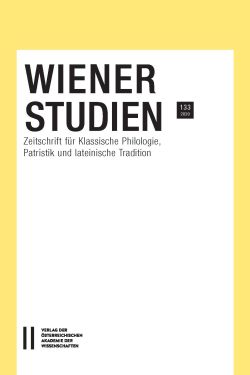
Wiener Studien 133/2020, pp. 237-278, 2020/07/23
Zeitschrift für Klassische Philologie, Patristik und lateinische Tradition
The following paper attempts a complete survey of the reception of the ancient Greek prose-writer Flavius Philostratus in the philological and poetical work of Angelo Poliziano. This comprises Poliziano’s early Italian poetry, his commentaries of the 1480’s, intended as aide-mémoires for his university lectures, his later Latin poetry (based on this philological work), and finally his dedicatory letter to Piero de’ Medici, which can be read as a renewed version of the treatise on epistolary style by Philostratus’ namesake, the so-called “Lemnian Philostratus.” The paper, therefore, shows in a detailed case-study how Poliziano fulfilled the Alexandrian ideal of combining philological erudition with poetical creativity. Not just major authors but also a less well-known writer such as Philostratus could contribute something to Poliziano’s encyclopaedic vision of the ancient world.